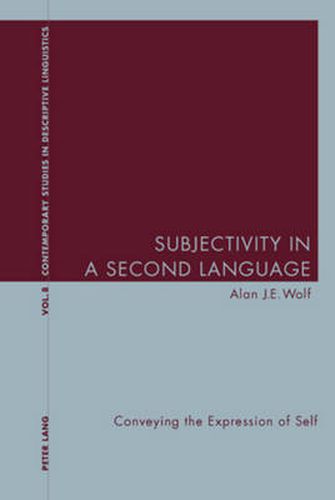Readings Newsletter
Become a Readings Member to make your shopping experience even easier.
Sign in or sign up for free!
You’re not far away from qualifying for FREE standard shipping within Australia
You’ve qualified for FREE standard shipping within Australia
The cart is loading…






This title is printed to order. This book may have been self-published. If so, we cannot guarantee the quality of the content. In the main most books will have gone through the editing process however some may not. We therefore suggest that you be aware of this before ordering this book. If in doubt check either the author or publisher’s details as we are unable to accept any returns unless they are faulty. Please contact us if you have any questions.
Subjectivity, the speaker’s expression of self in discourse, is a relatively under-researched area in the field of applied linguistics: this book examines the role of subjectivity in the context of second language use. Drawing on insights from discourse analysis and pragmatics, it describes how a group of students studying French at degree level at the University of Cambridge, England, convey expressions of subjectivity in personal narratives and argumentative language.
In this book, the author begins by introducing the reader to key areas in the study of discourse. Using a methodology that has much in common with descriptive linguistics, he provides a wide-ranging account of how forms in language are used to convey the expression of subjectivity. His particular concern is to examine how these markers of subjectivity are used differently by native and non-native speakers of French. The discussion is carefully supplemented throughout with a variety of exemplification and discourse types, including personal narratives in French and English and transcripts of video-taped interactions in role-plays.
In the course of his analysis, the author questions long-held assumptions about the way French is taught in secondary schools and in higher education institutions. The range of issues discussed, as well as the variety of examples used, will make this a valuable book not only for students of applied linguistics but also for any reader wishing to gain a deeper understanding of how the expression of subjectivity can contribute to the learning of a second language.
$9.00 standard shipping within Australia
FREE standard shipping within Australia for orders over $100.00
Express & International shipping calculated at checkout
This title is printed to order. This book may have been self-published. If so, we cannot guarantee the quality of the content. In the main most books will have gone through the editing process however some may not. We therefore suggest that you be aware of this before ordering this book. If in doubt check either the author or publisher’s details as we are unable to accept any returns unless they are faulty. Please contact us if you have any questions.
Subjectivity, the speaker’s expression of self in discourse, is a relatively under-researched area in the field of applied linguistics: this book examines the role of subjectivity in the context of second language use. Drawing on insights from discourse analysis and pragmatics, it describes how a group of students studying French at degree level at the University of Cambridge, England, convey expressions of subjectivity in personal narratives and argumentative language.
In this book, the author begins by introducing the reader to key areas in the study of discourse. Using a methodology that has much in common with descriptive linguistics, he provides a wide-ranging account of how forms in language are used to convey the expression of subjectivity. His particular concern is to examine how these markers of subjectivity are used differently by native and non-native speakers of French. The discussion is carefully supplemented throughout with a variety of exemplification and discourse types, including personal narratives in French and English and transcripts of video-taped interactions in role-plays.
In the course of his analysis, the author questions long-held assumptions about the way French is taught in secondary schools and in higher education institutions. The range of issues discussed, as well as the variety of examples used, will make this a valuable book not only for students of applied linguistics but also for any reader wishing to gain a deeper understanding of how the expression of subjectivity can contribute to the learning of a second language.